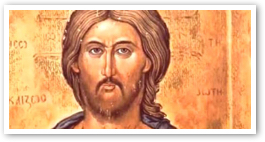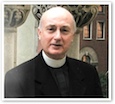"Says who?"
- FATHER GEORGE W. RUTLER
That challenge to authority is not confined to adolescents.
 It is a valid question, provided one wants a legitimate answer. The right use of authority is a staple of civilized order, and its abuse is the engine of the worst civil crimes. That is why our government has a system of checks and balances.
It is a valid question, provided one wants a legitimate answer. The right use of authority is a staple of civilized order, and its abuse is the engine of the worst civil crimes. That is why our government has a system of checks and balances.
The source of Christ's authority was the big question when he healed and forgave sins. He taught "as one with authority and not as the scribes." When accused of using Satan as the source of his authority over evil spirits, he replied that a house divided against itself cannot stand, and when Pilate invoked his own authority, the Lord told him that he would have no authority at all were it not "given from above." Conflicted, Pilate on his grand judgment throne suddenly seemed shriveled by Christ's innocence, and he surrendered his authority to the mob. Here was Shakespeare's "Man, proud man, dressed in a little brief authority."
In Pilate's civil order, his authority had been delegated in a pragmatic system for promoting "the tranquility of order" according to natural law. By contrast, Christ's authority was intrinsic because it was divine. So it is with the Church he established when he gave the heavenly keys to Peter. There are three options in response: to deny his authority, to attack it, or to embrace it.
Entrusted with divine authority, the Church, when true to herself, respects the free will with which man is endowed, so when it comes to matters of faith, she "proposes and does not impose." But faith itself is not enough. As St. Paul warned the Corinthians, one can speak with the "tongues of men or of angels" but can still sound like a "banging gong or clanging cymbal." To produce results, the human response to the divine summons must be activated by love. Saint Augustine said: "Faith is mighty, but without love it profits nothing."
Satan and his evil spirits that "prowl the world" have faith in Christ in the sense that they have no doubt that he is divine. "I know who you are." Satan's endless agony is that his knowledge of God is divorced from love of God. We risk courting that misery if we consider God as a power without logic. Such a god was what Pope Benedict described in his classic Regensburg Address: a god who is absolute will, without any identity beyond sheer power. Such is the god of terrorists, creating rage in a culture that is unable to deal with logic.
The Divine Word who authored all things into existence speaks with authority without being authoritarian: "You know that those who are regarded as rulers of the Gentiles, lord it over them, but it must not be so with you. Rather, whoever wishes to be great among you must be your servant" (Mark 10:42-43).
 This is Meaghen Gonzalez, Editor of CERC. I hope you appreciated this piece. We curate these articles especially for believers like you.
This is Meaghen Gonzalez, Editor of CERC. I hope you appreciated this piece. We curate these articles especially for believers like you.
Please show your appreciation by making a $3 donation. CERC is entirely reader supported.

Acknowledgement
 Father George W. Rutler. ""Says who?" From the Pastor (February 8, 2015).
Father George W. Rutler. ""Says who?" From the Pastor (February 8, 2015).
Reprinted with permission of Father George W. Rutler.
The Author
 Father George W. Rutler is the pastor of St. Michael's church in New York City. He has written many books, including: The Wit and Wisdom of Father George Rutler, The Stories of Hymns, Hints of Heaven: The Parables of Christ and What They Mean for You, Principalities and Powers: Spiritual Combat 1942-1943, Cloud of Witnesses — Dead People I Knew When They Were Alive, Coincidentally: Unserious Reflections on Trivial Connections, A Crisis of Saints: Essays on People and Principles, Brightest and Best, and Adam Danced: The Cross and the Seven Deadly Sins.
Father George W. Rutler is the pastor of St. Michael's church in New York City. He has written many books, including: The Wit and Wisdom of Father George Rutler, The Stories of Hymns, Hints of Heaven: The Parables of Christ and What They Mean for You, Principalities and Powers: Spiritual Combat 1942-1943, Cloud of Witnesses — Dead People I Knew When They Were Alive, Coincidentally: Unserious Reflections on Trivial Connections, A Crisis of Saints: Essays on People and Principles, Brightest and Best, and Adam Danced: The Cross and the Seven Deadly Sins.




